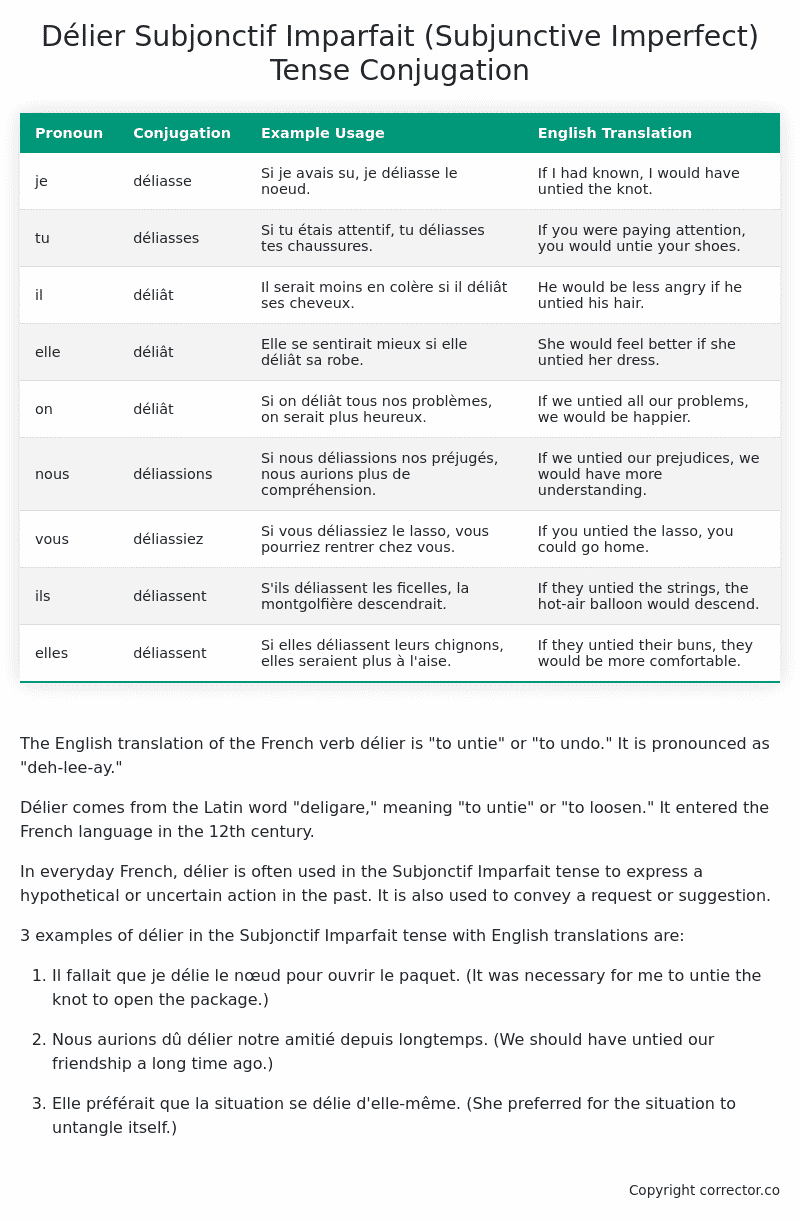Subjonctif Imparfait (Subjunctive Imperfect) Tense Conjugation of the French Verb délier
Introduction to the verb délier
The English translation of the French verb délier is “to untie” or “to undo.” It is pronounced as “deh-lee-ay.”
Délier comes from the Latin word “deligare,” meaning “to untie” or “to loosen.” It entered the French language in the 12th century.
In everyday French, délier is often used in the Subjonctif Imparfait tense to express a hypothetical or uncertain action in the past. It is also used to convey a request or suggestion.
3 examples of délier in the Subjonctif Imparfait tense with English translations are:
-
Il fallait que je délie le nœud pour ouvrir le paquet.
(It was necessary for me to untie the knot to open the package.) -
Nous aurions dû délier notre amitié depuis longtemps.
(We should have untied our friendship a long time ago.) -
Elle préférait que la situation se délie d’elle-même.
(She preferred for the situation to untangle itself.)
Table of the Subjonctif Imparfait (Subjunctive Imperfect) Tense Conjugation of délier
| Pronoun | Conjugation | Example Usage | English Translation |
|---|---|---|---|
| je | déliasse | Si je avais su, je déliasse le noeud. | If I had known, I would have untied the knot. |
| tu | déliasses | Si tu étais attentif, tu déliasses tes chaussures. | If you were paying attention, you would untie your shoes. |
| il | déliât | Il serait moins en colère si il déliât ses cheveux. | He would be less angry if he untied his hair. |
| elle | déliât | Elle se sentirait mieux si elle déliât sa robe. | She would feel better if she untied her dress. |
| on | déliât | Si on déliât tous nos problèmes, on serait plus heureux. | If we untied all our problems, we would be happier. |
| nous | déliassions | Si nous déliassions nos préjugés, nous aurions plus de compréhension. | If we untied our prejudices, we would have more understanding. |
| vous | déliassiez | Si vous déliassiez le lasso, vous pourriez rentrer chez vous. | If you untied the lasso, you could go home. |
| ils | déliassent | S’ils déliassent les ficelles, la montgolfière descendrait. | If they untied the strings, the hot-air balloon would descend. |
| elles | déliassent | Si elles déliassent leurs chignons, elles seraient plus à l’aise. | If they untied their buns, they would be more comfortable. |
Other Conjugations for Délier.
Le Present (Present Tense) Conjugation of the French Verb délier
Imparfait (Imperfect) Tense Conjugation of the French Verb délier
Passé Simple (Simple Past) Tense Conjugation of the French Verb délier
Passé Composé (Present Perfect) Tense Conjugation of the French Verb délier
Futur Simple (Simple Future) Tense Conjugation of the French Verb délier
Futur Proche (Near Future) Tense Conjugation of the French Verb délier
Plus-que-parfait (Pluperfect) Tense Conjugation of the French Verb délier
Passé Antérieur (Past Anterior) Tense Conjugation of the French Verb délier
Futur Antérieur (Future Anterior) Tense Conjugation of the French Verb délier
Subjonctif Présent (Subjunctive Present) Tense Conjugation of the French Verb délier
Subjonctif Passé (Subjunctive Past) Tense Conjugation of the French Verb délier
Subjonctif Imparfait (Subjunctive Imperfect) Tense Conjugation of the French Verb délier (this article)
Subjonctif Plus-que-parfait (Subjunctive Pluperfect) Tense Conjugation of the French Verb délier
Conditionnel Présent (Conditional Present) Tense Conjugation of the French Verb délier
Conditionnel Passé (Conditional Past) Tense Conjugation of the French Verb délier
L’impératif Présent (Imperative Present) Tense Conjugation of the French Verb délier
L’infinitif Présent (Infinitive Present) Tense Conjugation of the French Verb délier
Struggling with French verbs or the language in general? Why not use our free French Grammar Checker – no registration required!
Get a FREE Download Study Sheet of this Conjugation 🔥
Simply right click the image below, click “save image” and get your free reference for the délier Subjonctif Imparfait tense conjugation!

Délier – About the French Subjonctif Imparfait (Subjunctive Imperfect) Tense
Formation
Common Everyday Usage Patterns
Interactions with Other Tenses
Subjonctif Présent
Indicatif Passé Composé
Conditional
Conditional Perfect
Summary
I hope you enjoyed this article on the verb délier. Still in a learning mood? Check out another TOTALLY random French verb conjugation!


